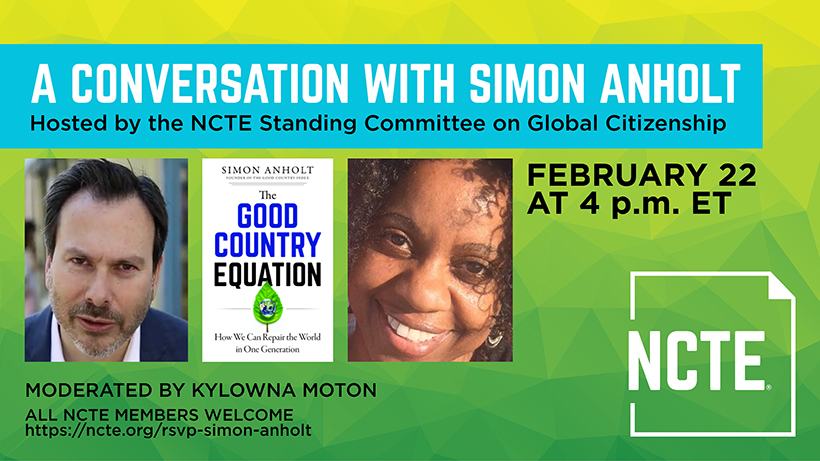From the NCTE Standing Committee on Global Citizenship.
This post was written by Kylowna Moton, a member of the NCTE Standing Committee on Global Citizenship.
“If we only have the patience to work for one generation, systematically and together, with courage and imagination, on building the attitudes and behaviors and knowledge that underpin the solutions to these gigantic problems, we can defeat them all.” —Simon Anholt
 If there is one thing we are sure of in the 21st century, it is that we face big problems. The COVID-19 pandemic, as horrible as it is, is only one of them. Like the pandemic, the major challenges we face in the 21st century—climate change, wealth inequality, systemic discrimination, injustice, and so on—have great potential to devastate and no respect for the imaginary lines we draw to separate humanity into “us” and “them.” Like a pandemic, the big problems of our time cannot be truly solved by one nation—any one nation—acting in isolation. That is one of the messages at the heart of Simon Anholt’s 2020 book, The Good Country Equation: How We Can Repair the World in One Generation: we need to work together if we are going to truly overcome the challenges we face as a species.
If there is one thing we are sure of in the 21st century, it is that we face big problems. The COVID-19 pandemic, as horrible as it is, is only one of them. Like the pandemic, the major challenges we face in the 21st century—climate change, wealth inequality, systemic discrimination, injustice, and so on—have great potential to devastate and no respect for the imaginary lines we draw to separate humanity into “us” and “them.” Like a pandemic, the big problems of our time cannot be truly solved by one nation—any one nation—acting in isolation. That is one of the messages at the heart of Simon Anholt’s 2020 book, The Good Country Equation: How We Can Repair the World in One Generation: we need to work together if we are going to truly overcome the challenges we face as a species.
Throughout his career, Simon Anholt has consulted with the heads of state and governments of 57 countries, advising them to meet their needs and solve their problems by thinking beyond their borders. “All of our problems today,” he says, “are thoroughly globalized. In fact, the problem with the world that we are living in at the moment is that our problems, our challenges, are more globalized than our solutions. This is the imbalance.”
If more governmental leaders cooperated—rather than competed—with other nations, not only would they come closer to solving the problems they have in common, but they would make their countries more “good” in the process. For Anholt, a “good” country can pursue its own interests without costing other countries, preferably while also benefitting the others (see Good Country Index).
In 2020, Anholt turned his idea of what it means to be “good” toward a new project: The Good Generation. For this project, Anholt needs input and help from educators. While Anholt acknowledges that there are educational programs around the world that do a fine job of teaching the kinds of content and thought processes that upcoming generations will need to improve the world and sustain humanity, he also notes that these programs often work in isolation. They will need to work in concert if we are to raise and educate a generation of individuals who are ready to “run towards the global issues that threaten humanity, instead of running away from them, as so many of us do today.”
The Good Country Equation presents readers with some good news and some bad news. The bad news is that all our major, global problems are the result of human behavior: 1) how governments behave, and 2) how individuals behave. The good news is that “if people are the problem, they are also the solution.”
 Kylowna Moton is an associate professor of English at Los Angeles City College, and taught English in the Los Angeles Unified School District for over 20 years. She is a member of the NCTE Standing Committee on Global Citizenship. Her research interests include everyday rhetoric and decolonizing the classroom as a means promoting lifelong literacy to reluctant and emergent readers and writers. Kylowna is an avid traveler and sees her work as integral to her experience of the world and its people.
Kylowna Moton is an associate professor of English at Los Angeles City College, and taught English in the Los Angeles Unified School District for over 20 years. She is a member of the NCTE Standing Committee on Global Citizenship. Her research interests include everyday rhetoric and decolonizing the classroom as a means promoting lifelong literacy to reluctant and emergent readers and writers. Kylowna is an avid traveler and sees her work as integral to her experience of the world and its people.
Join the Standing Committee on Global Citizenship on Monday, February 22, 4 p.m. ET, for a Conversation with Simon Anholt about how NCTE members can be part of the solution and help shape a “Good Generation.”

